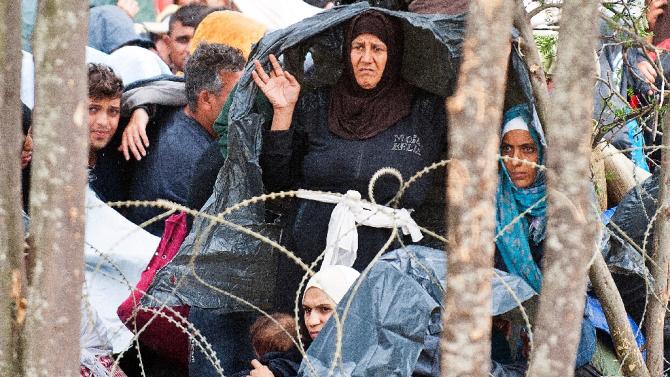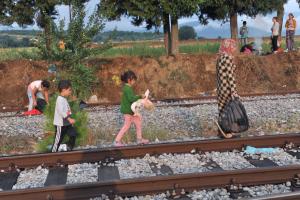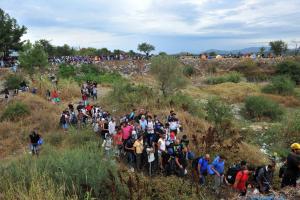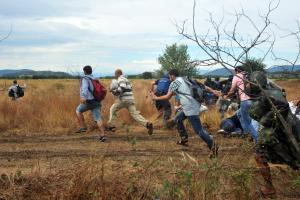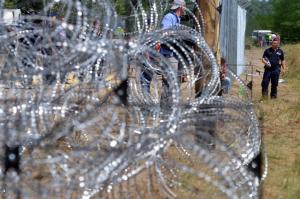Date: Sat, 22 Aug 2015 23:51:08 +0200
Gevgelija (Macedonia) (AFP) - Hundreds of refugees broke through barbed wire fencing bordering Macedonia despite a heavy police presence Saturday in another dramatic chapter of Europe's escalating migrant crisis.
And in Italy, rescuers scrambled to save up to 3,000 migrants from waters off Libya after the coastguard was deluged Saturday with SOS calls from 18 different overcrowded boats.
On the Macedonian border, police hurled stun grenades and used batons in a failed bid to stop the refugees from breaking through. At least four people were lightly injured in the incident, an AFP correspondent reported.
Police appeared to regain control of the situation in about 30 minutes, stopping the flow of people with a dozen stun grenades.
Those who managed to cross into Macedonia rushed to the town of Gevgelija and sought taxis or other transportation toward Serbia on their way through the Balkans to the European Union border.
Earlier Saturday hundreds of refugees seeking to reach western Europe arrived at the Greek-Macedonian border joining around 2,000 others who have been stranded there since Thursday after being stopped by Macedonian police.
The refugees and migrants, who spent the night sleeping out in the open despite heavy rain and chilly overnight temperatures, were allowed by the police in groups of about a dozen to enter the country, but that was not fast enough for exhausted people stuck for days in this no-man's land, without proper shelter, food and water.
- Massive Italy rescue -
Meanwhile, the Italian coastguard Saturday coordinated a massive rescue operation at sea for an estimated 2,000 to 3,000 people.
At least seven boats - six Italian and one from Norway - were involved in the operation to get the migrants safely off 14 overcrowded rubber dinghies and four other vessels.
More than 104,000 migrants from Africa, the Middle East and South Asia have landed at Italy's southern ports so far this year after being rescued in the Mediterranean.
Italian police said they had arrested six Egyptian nationals on suspicion of people smuggling following the rescue of a stricken boat on Wednesday.
Testimony from the 432 migrants on board suggest the vessel had been packed with more than 10 times the number of people it was designed for, with many of the passengers, including a number of women and children, locked below deck.
They had each paid the traffickers 2,000 euros for the passage from Egypt to Italy, according to statements given to police.
- EU urged to up support -
As the humanitarian crisis worsens, the UN refugee agency (UNHCR) has voiced concern over the deteriorating situation on the Macedonian border.
Macedonian Foreign Minister Nikola Poposki assured UN High Commissioner for Refugees António Guterres "that the border will not be closed in the future," an agency statement said.
It called on the European Union to "step up support for countries affected" by the movement of refugees and migrants in southeastern Europe.
Figures from the UNHCR show thousands of desperate people, most of them from Syria, Afghanistan and Iraq, have been pouring into Greece on a weekly basis with the aim of travelling through Macedonia and Serbia to reach the European Union.
Some 42,000 people, including more than 7,000 children, have entered Macedonia since mid-June, the government in Skopje said.
- 'Help us' -
Those stranded in makeshift camps inside the no-man's land between Macedonia and Greece voiced feelings of desperation as some wandered through piles of rubbish, gazing towards the Macedonian border.
Overnight police had doubled the barbed wire fence at the border, while some refugees pleaded with them, shouting "Help us!"
"It rained and many people couldn't protect themselves. One mother lost her daughter and was calling for her all through the night," said Samer Moin, a 49-year-old doctor from Syria who crossed from Turkey to the Greek island of Halki, before managing to reach the Macedonian border.
"I've been here for days. I want go to Norway," he told AFP.
In the Macedonian border town of Gevgelija, two out of five scheduled trains, each capable of holding between 100 and 700 passengers, left Saturday with the service laid on exclusively for refugees and migrants.
It takes around four hours by train to reach Tabanovce on Macedonia's northern border with Serbia, which lies some 180 kilometres (110 miles) away.
At the station, hundreds of people could be seen waiting for the next train, some of whom had set up small tents trying to take shelter from the rain.
Once they reach Serbia, the refugees and migrants will try to make their way to Hungary, which is a major crossing point into the European Union, although the country is building a four-metre (13-foot) barbed wire fence along its 175-kilometre border to stop the influx.
